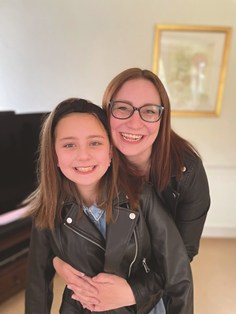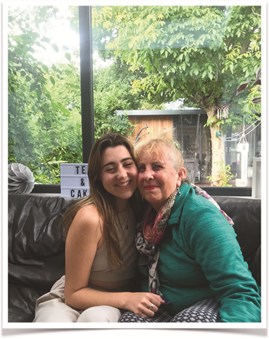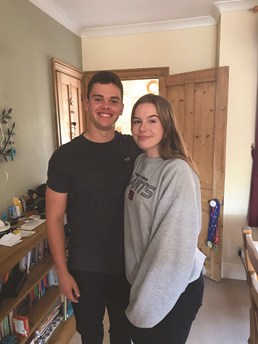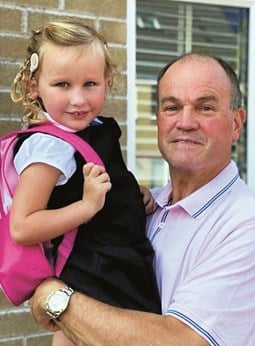How do I... support my family with deafness?
It’s often said that it takes a village to raise a child, so we spoke to wider family and friends to find out how they adapted to having a deaf child or young person in the family.

Gail is aunt to Freya (10), who is profoundly deaf.
Freya was the first baby born into the family, much anticipated and much loved. Almost 11 years later, that feeling hasn’t changed.
Like many families, we had no experience of deafness when Freya was born. It was a gradual process of learning over two years, from her initial screening to the diagnosis of a profound loss and being fitted with cochlear implants. During this time, my sister Lynn was given a lot of information to take in. It was important to me that I knew as much as possible to make sure I was best placed to support, offer a different viewpoint or just be there to listen.
We started a family sign language course and from there I completed levels 1, 2 and 3 in British Sign Language (BSL), meeting some fabulous people along the way. My sister got involved with the local deaf children’s society and we would all go along to fun days and outings, taking Freya’s hearing cousins. Deaf awareness, radio aids, captions and sign language are part of our daily lives. In our case, three heads are better than one!
My niece is just incredible. I love every bit of her and I’m so proud to be her auntie.

Cilla is grandmother to India (20), who is profoundly deaf.
It was a gradual process learning about India’s deafness, as it wasn’t picked up at birth. She had words and she babbled. She was, and still is, a brilliant communicator. Around three years old, it was becoming clear she might need some help as her speech development seemed delayed. A specialist assessment revealed she had never heard, due to congenital cochlear damage to both ears. It did come as a shock to her parents and, at first, we were at a bit of a loss as to how to help.
When she was a young girl, I supported India in lots of ways, no differently from our other three grandchildren. For example, taking care of her when Mum and Dad worked, went out or just needed a break, being there for them and helping work through problems or difficulties, taking her to birthday parties and special events, having sleepovers, fun days and holidays. Of course, being deaf brings its own challenges, so lots of reading and research were needed to help find solutions to problems, including going along to her appointments to listen in so me and Mum could chat it out after.
I also attend a weekly BSL course to develop my own signing skills to better support her.

Isobel is the girlfriend of Ed (20), who is severely to profoundly deaf.
I met my boyfriend, Ed, at a party two years ago. We were both getting drinks at the bar when I smiled at him. We got chatting, and that was when Ed first told me he was deaf.
Since then, I’ve learnt more ways to support him with his hearing loss and have come to really understand and admire the effort that deaf people, like Ed, put into their everyday lives. When we’re at restaurants or out with friends, Ed can miss questions or parts of the conversation. He’s an independent guy, so I know it’s important not to diminish that by answering questions for him or speaking on his behalf. Instead, I’ll look at him so he can lip-read me, and repeat what was said so he can answer for himself. We also came up with some hand signals together.
My advice for anyone with a deaf partner would be: try to sit by the wall and away from speakers in restaurants, if you’re out with friends, let your partner sit in the middle so they can see everyone’s faces, and, if they wear hearing aids like Ed, always carry spare batteries! They will inevitably manage to run out right in the middle of the movie!

Jon is grandpa to Lois (6), who is profoundly deaf.
When I first heard that my granddaughter, Lois, had been diagnosed with profound deafness, I felt completely devastated, brokenhearted, and concerned for her future. I just wanted to sort it out and make everything right, not only for her but for her parents as well. I wanted to be a protective grandpa.
I tried to support Lois’s parents with their own despair by listening to their concerns and questions. I tried to help them rationalise the situation and stop the panic we all felt. Offering support was all I could do to help them, other than small things like looking after Lois to enable them to attend information sessions, and joining them on open days to obtain as much information as possible.
The road to getting her implants was long and difficult. I listened to her parents and encouraged them to keep pushing forward to get the best outcome for Lois. It was important to remind them that they were making difficult decisions, but Lois was their motivation.
Since Lois’s diagnosis, I have learnt some BSL and, through this, have met other families in the same situation as us. It’s uplifted me to know that, although my beautiful granddaughter is deaf, her deafness doesn’t define her, but it’s part of her. Anything is possible.
